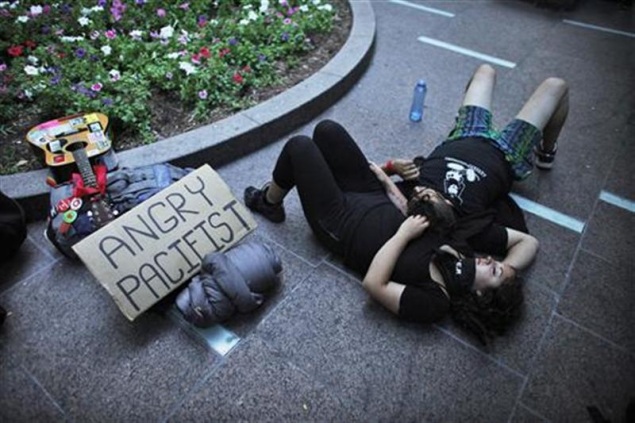- Home
- Social networking
- Social networking News
- Occupy Wall Street protester seeks to block tweets subpoena
Occupy Wall Street protester seeks to block tweets subpoena

Malcolm Harris, a Brooklyn-based writer, filed a civil proceeding on Monday seeking to block the judge's ruling.
Harris was arrested during a protest on the Brooklyn Bridge last October and charged with disorderly conduct in a case that is one of a handful in which authorities have sought to use social media to prosecute defendants.
Criminal Court Judge Matthew Sciarrino has rebuffed separate attempts by Harris and Twitter to quash a subpoena served on the company by the Manhattan district attorney's office seeking Harris' tweets for September to December.
Harris claims the information sought by prosecutors is akin to surveillance records, because computer logs will show his location when he connected to the site.
"In this case, anyone reviewing the information and material Twitter has been ordered to turn over will know each time between September 15 and December 30, 2011, Harris logged into his Twitter account, where he was when he logged in, how long he remained there and both what he did and who he communicated with while he was logged in," Harris' lawyers wrote in a memorandum accompanying the petition.
Prosecutors from the Manhattan district attorney's office have said in court papers that Harris' tweets could demonstrate he knew police had ordered protesters not to walk onto the bridge roadway.
Harris' lawyer, Martin Stolar of the National Lawyers Guild, and other lawyers for the arrested protesters have said police appeared to lead the march onto the roadway before suddenly arresting hundreds of them.
Sciarrino ruled in April that Harris did not have the standing to challenge the subpoena, since Twitter owned his tweets. In June, he rejected Twitter's argument that turning over the tweets violated Harris' privacy and free speech rights, saying the tweets were publicly posted without any expectation of privacy.
Twitter has filed a separate notice of appeal, though it has not yet submitted its formal brief.
Criminal defendants typically are required to wait until the end of criminal proceedings before filing appeals. But Stolar said Sciarrino's ruling threatened Harris' privacy and required an immediate response.
Harris' filing also seeks an order requiring Sciarrino to recognize his standing to challenge the subpoena on free speech grounds and the Fourth Amendment's protection against warrantless searches.
The Manhattan district attorney's office declined to comment on the filing.
Copyright Thomson Reuters 2012
For the latest tech news and reviews, follow Gadgets 360 on X, Facebook, WhatsApp, Threads and Google News. For the latest videos on gadgets and tech, subscribe to our YouTube channel. If you want to know everything about top influencers, follow our in-house Who'sThat360 on Instagram and YouTube.
Related Stories
- Samsung Galaxy Unpacked 2025
- ChatGPT
- Redmi Note 14 Pro+
- iPhone 16
- Apple Vision Pro
- Oneplus 12
- OnePlus Nord CE 3 Lite 5G
- iPhone 13
- Xiaomi 14 Pro
- Oppo Find N3
- Tecno Spark Go (2023)
- Realme V30
- Best Phones Under 25000
- Samsung Galaxy S24 Series
- Cryptocurrency
- iQoo 12
- Samsung Galaxy S24 Ultra
- Giottus
- Samsung Galaxy Z Flip 5
- Apple 'Scary Fast'
- Housefull 5
- GoPro Hero 12 Black Review
- Invincible Season 2
- JioGlass
- HD Ready TV
- Laptop Under 50000
- Smartwatch Under 10000
- Latest Mobile Phones
- Compare Phones
- Infinix Smart 9 HD
- Lava Yuva Smart
- Samsung Galaxy S25 Ultra
- Samsung Galaxy S25+
- Samsung Galaxy S25
- Realme 14 Pro 5G
- Realme 14 Pro+ 5G
- Itel Zeno 10
- Asus Chromebook CR11
- Lenovo Yoga Slim 9i (2025)
- Asus ROG Flow Z13 (2025)
- Xiaomi Pad 7
- Titan Evolution
- Noise ColorFit Pro 6
- Sony 65 Inches Ultra HD (4K) LED Smart TV (KD-65X74L)
- TCL 55 Inches Ultra HD (4K) LED Smart TV (55C61B)
- Sony PlayStation 5 Pro
- Sony PlayStation 5 Slim Digital Edition
- Blue Star 1.5 Ton 3 Star Inverter Split AC (IC318DNUHC)
- Blue Star 1.5 Ton 3 Star Inverter Split AC (IA318VKU)















